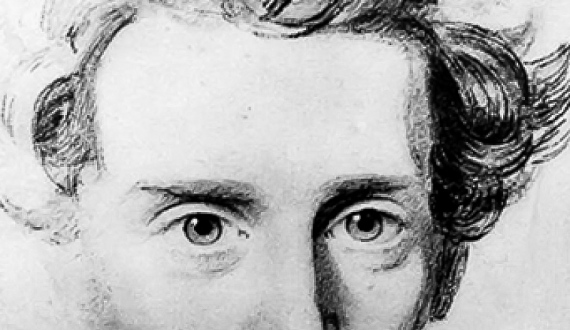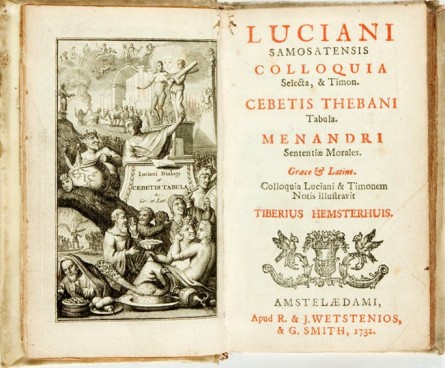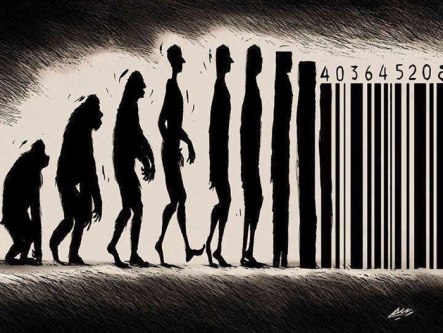
The intelligentsia professes to admire irony. In the 1990s the members of that class watched Seinfeld in first-run and they subsequently bought the program on DVD because they took it for ironic. In the 2010s they watched Larry David’s Curb Your Enthusiasm for the identical reason. Intellectuals usually identify themselves as ironists, of a rarer variety even than the redoubtable television comedian, whether it is Seinfeld or David, on the supposition that they stand askew to the prevailing social consensus, such that their perspective yields them an insight into matters opaque to hoi polloi. “I have baffled them,” the late Joseph N. Riddell, an English professor, once said within earshot of his graduate students while emerging from the Haines Hall lecture auditorium at UCLA. He had been deconstructing Ralph Waldo Emerson and Edgar Allan Poe in a lecture that quoted Jacques Derrida and other then-obligatory Frenchmen rather more than it quoted Emerson or Poe. The remark partook more in the self-congratulatory than in the ironic, but it was symptomatic of a certain enduring intellectual conceit in which the sense of a privilege of irony, or a satisfaction in superiority, also takes root. The modern or postmodern intellectual pretends to hover above the settled and the established, to gaze down upon the “culturescape,” as though from a height. Even while he declares himself “against Platonism” and works “to subvert metaphysics,” he cannot help but to take, likely without grasping the contradiction, a transcendentally guaranteed view of life, the world, and everything. Naturally he will deny participating in a transcendent domain, the idea of which he will mock, borrowing from Friedrich Nietzsche’s redoubtable treasure-trove of anti-Christian sophisms, but probably without knowing it.

I. Yet for a hundred years and more, intellectual discourse has meant institutional discourse, because, in the modern context, no such creature as a non-institutionalized intellectual exists. The history of Western intellectualism indeed conforms to the pattern that its adherents have never actively resisted their own institutionalization; society has put them away into established Bedlams where they have tended happily to remain under the comforting delusion of their tenure. The grunting and squinting of deconstruction and the Brave New Worlds of Feminism and Multiculturalism have all taken place, thanks to the largesse of the taxpaying middle class, within the walls, where the Neveu de Rameau-like commotion will least bother ordinary people on their way to and from productive work. The non-resistance of the intellectuals to their institutionalization amounts tacitly to agreement with the consensus. This would be the consensus with which the intellectual claims heartily – as it were, in principle – to disagree. The non-resistor postures and fulminates, thus emphasizing his (or her) technical disagreement; but his (or her) consent to immurement, with a salary, adequately guarantees his (or her) essential docility. He (or she) hardly hovers high above the world. No: he (or she) lives under lockdown, each in his appointed cell. Women and minorities request and receive double immurement in their own set-aside programs. Regular ritual occasions in the quadrangle advertise the courage of it all and provide the opportunity to say, “I am – somebody!”
As Søren Kierkegaard puts it in his Concept of Irony (1841; translated by Hong), no sooner have the people relinquished all spiritual convictions, when “the ‘Professor’ appears.” That august figure conjures himself on the scene, in the Dane’s words, “through [the] many arguments [that] he is able to prove, to substantiate, and to comprehend,” until he constitutes a being “scientifically arranged in paragraphs.” Kierkegaard adds that, “The ‘Professor’ of course flatters himself and the respective graduate students and undergraduates and all their intended with the idea that the ‘Professor’ is Evolution’s finest and richest flower.” Here, in a journal entry from 1851, Kierkegaard indulges his own rich irony: a hunchbacked social misfit, he jilted a beautiful girl who could see past his physical misshapenness; he then spent his life writing philosophical treatises and peculiar novels that few or none read and conducting debates in Copenhagen newspapers on arcane issues of state-sanctioned theology and the established church. Kierkegaard referred to himself in his private Papers as a “martyr of laughter,” meaning that, because of his awkward physique and because men of patented authority designated him as an intellectually incompetent provocateur, he served as a perennial butt of finger-pointing jokes in public. The Corsair famously and regularly pilloried Kierkegaard, selling many copies in doing so. The journal’s cartoonist brutally caricatured his object’s physical deformities. Contemporary objects of cartoon satire and editorial lampoon occupy a lower rung on the ladder of self-development than did Kierkegaard. Yet contemporary journalism, circulating the coin of popular culture, consists of little else than sarcastic mockery. Etymologically, sarcasm has to do with mocking a corpse, who safely from the perspective of the mocker cannot respond.
Kierkegaard had once naively seen for himself a career either as a holder of academic office in the state-funded university or as a clergyman in the Danish Lutheran Church, likewise established. Kierkegaard’s dissertation, The Concept of Irony (1841), nestles itself in the prevailing language of Hegelianism and cites a bibliography of approved Young Hegelian authorities, such as Friedrich Christian Baur (1792–1860), a radical and skeptic who extolled Gnosticism. Apologizing for heresy generated excitement and drew attention to the apologist. In the same way, a twenty-something doctoral candidate of the 1980s would have written in the jargonized style then regnant and would have cited the stellar poststructuralists, such as Michel Foucault or Monsieur Derrida; or, in later decades the prominent feminists, multiculturalists, or intersectionalists. The craze nowadays, as it has been for two decades, is for so-called transgressive discourse. One pursues one’s career in the perfervid language of adolescent contrariness, championing the trivial against the serious, the abnormal against the normal, the hysterical against the Stoic, while assuming the mien of an iconoclast. In the selfsame moment, however, when Kierkegaard seemingly accommodates himself to the emergent consensus, he begins to undermine it. His dissertation is not merely a study of irony; it is practice in irony. The Concept of Irony suggests the articulation, not of a professor, but of an anti-professor. Indeed, The Concept of Irony qualifies itself with the subtitle, With Constant Reference to Socrates – the man above whom, for Kierkegaard, none save Jesus ranks higher in the anti-professorial hierarchy.

More than one feature of Kierkegaard’s discussion of irony will strike apostates from post-modernity as applicable to the prevailing institutional (sub-) mentality. The mere fact of Kierkegaard’s insistent and by-no-means-unmotivated linkage of irony to the person of Socrates, especially in light of the Athenian’s quasi-sacrificial demise, suggests the participation of things ironic in things sacred. Irony, according to the Dane, always but indirectly constitutes an attempt to address the mob, which wants to hear nothing contrary to its motile will. The prominence of Socrates’ “sign” or daimon in The Concept hints further at a relation binding irony to signification. Irony, says Kierkegaard, always points to something about which the rules forbid one directly to speak. The Kierkegaardian irony relates to the stubborn persistence, in societies that see themselves as the acme of sophistication, of primitive injunctions. The Kierkegaardian irony finally concerns the grammar of the “indicative.” It will be useful, therefore, before expounding the pertinent features of Kierkegaard’s investigation, to review briefly the “originary analysis” of irony found in Eric Gans’ Signs of Paradox (2001). Gans remarks that the ironic perspective – or pose or whatever it might be – is “always gifted with prestige” and that it supposes the “knowing superiority” of the subject “to the ironies of fate that await us in the real world.” Here irony means reversal, as in an Athenian tragedy. While “irony is,” as Gans sees it, “central to all thought” and while it indeed forms an element in the “historical human sign-system of language,” mastery of irony, if irony is to function as a recognizable, differentiated aspect of that system, must be rare rather than universal.
Exactly this rarity of command over irony endows irony with its prestige and makes it, not only a focus of desire, but also and necessarily a ground for resentment. Even those in the Athenian assembly who vote to condemn Socrates, especially his trio of accusers, envy him his dialectical wit. They wish that they might slay forensic opponents as easily as he with the sword of mere repartee. Once they have done away with Socrates, he can no longer lord it over them, as the living proof of their intellectual inferiority. Real ironists annoy non-ironists, biting at non-ironist tail-ends like gadflies, yet everyone in a modern, institutional context wants to wear the badge of irony. Given that possession of irony imbues the possessor with charisma, it would hardly be surprising to discover that some people believe themselves to be ironists who, objectively, are not. The possibility exists that the Seinfeld audience consisted (or consists) mainly of non-ironists who nevertheless feel like ironists when they are watching the episodes; moreover, as Seinfeld directs itself to the constituency of mass entertainment, this must be the case. It could even happen that groups of pretenders, organizing themselves, might lay claim falsely to the qualification of ironist and establish safeguards for protecting their domain. In an institutional setting, for example, where presumptive command of irony played a role in upholding one’s status, outsider-investigators could perhaps find in place prohibitions of questions or topics that have the potential of drawing nigh embarrassing revelations.
II. In Signs of Paradox, Gans argues that irony is “inherent in the sign-system.” According to Gans, “The primary characteristic of the sign is that is that it occupies a different level of being from the reality it designates”; and “this vertical difference [functions as] the basis of the opposition within the sign-system between signifier and signified.” The notion of “levels of difference” functions essentially in Gans’ discussion by reminding us that signification never expurgates its kernel of resentment. That jealousy never unfolds de haut en bas but always vice versa. The contemporary established world characteristically employs a vocabulary, afflicted by the French disease, which attacks the putative complacency of received theories of the sign and of signification. Since nothing of the past may enter into progress, all vestiges inherited wisdom, considered as mere delusions, become targets for deconstruction, which is to say annihilation. If irony inhabited and shaped signification from the beginning, however, then quite as Gans argues, the attempt to leave people in bafflement about language would also be an attempt to deprive them of irony and its benefits. The attempt to ball up language, so as to corrupt communications in the public square, would be the attempt to ball up irony itself, so as to deprive an independent criticism of one of the main weapons in its armory. When Gans invokes “the concrete,” he must be using that term, with its politically radical connotations, in a somewhat ironic manner. The irony of the materialist view, as seen from the outside, lies in its inability to accept the intangible as effective; hence it cannot understand renunciation, which it classes with religious phenomena such as asceticism, which it regards as delusory and ergo as anti-progressive.

For Gans, irony articulates that “fragility of the absolute, or ‘vertical,’ formal difference, inaugurated by the sign with reference to its source,” which he dubs “the relative or ‘horizontal’ difference in the real world between subject and object.” In the originary analysis, irony echoes the mutation of the ostensive into the imperative. The ostensive, readers will recall, emerges in the existential dilemma of the originary scene, where the convergent individuals of the pack cross the threshold from bestiality into humanity by recoiling from the item of appetite that has drawn them into dangerous centripetal confrontation. Through the ostensive, the incipient community designates the item whose appropriation each individual has renounced and that the crowd has renounced collectively: the ostensive refers to the object as an inaccessible presence, but as a presence nevertheless. The imperative refers to the absence of the object, for whose conciliatory power the community suddenly yearns in a renewal of crisis: the imperative “is [thus] uttered in the absence of [the] referent to make it appear… Pronouncing the word… is expected to produce the object.” In the originary analysis, the object that the community calls on to appear will still lie beyond accessibility, for it is not really an object, but a sign of social cohesion. Recalling the object through the imperative reinforces social cohesion, but it does nothing to diminish – rather, it intensifies – the frustration intrinsic to a turning-away from some tasty morsel. Irony must please the subject because the sign pleases, but “the pleasure of irony” will therefore qualify as an “esthetic pleasure” only, one that oscillates “between ascetic form and seductive content,” never reaching the latter.
For Kierkegaard, writing in The Concept, irony emerges in the Socratic commitment to conversation or dialectic as opposed to oratory. The sophists practice oratory and while not all of them behave so nakedly as do Thrasymachus in The Republic or Callicles in Gorgias, their overriding egotism, their desire to command, can hardly slip past even the most casual perusal. The sophists are utopians in the sense that they want to reorder the body politic for their exclusive convenience although they are likely to invoke natural precedence or some other justification when they attempt to do so. It will really be best for everyone, they implicitly say. Thus Callicles focuses in his discourse on themes of strength and repletion, nominating them as indices of a primordial dispensation that modern ideas have illegitimately displaced. “Nature… demonstrates that it is right that the better man should prevail over the worse and the stronger over the weaker,” he says, thereby conflating “better” with “stronger”; and “a man should encourage his appetites to be as strong as possible instead of repressing them.” Callicles defines “the happy life” as “having all the… appetites and being able to satisfy them with enjoyment.” When Socrates questions Callicles ironically to bring out the contradiction in the latter’s theory, Callicles, like an undergraduate, misunderstands the irony and accuses Socrates of being “sarcastic.” Kierkegaard says that, with regard to the egomaniacs and proto-tyrants, Socrates’ ironic comments have the effect of dispersing pretense – and so of annulling the coercive aggression of the speeches – while avoiding direct confrontation. Kierkegaard’s general formulation about the relation of Socratic irony to power requires sensitive interpretation: “What [Socrates] desires to censure by contrasting discoursing with conversing is the egotistical quality in eloquence that longs for what might be called abstract beauty, versus inopes rerum nugaequae canorae, and which sees in the expression itself, torn loose from its relation to an Idea, an object for pious veneration.”
One might be excused for thinking of all that postmodern prose in all those journals for thirty-five or forty years. In its context, Kierkegaard’s observation conforms to, even as it forecasts, the explanation in Signs of Paradox that irony binds together the “vertical” and the “horizontal” by commemorating both simultaneously through its “oscillating” type of double-awareness; the tendency of oratory, by contrast, is to forget the “vertical,” and to lurch along the plane of existence toward the indignity, which the orator foresees as a triumph, of mere appetitive consummation. The orator, like the dictator, doesn’t give a damn for conversation or for definitions or for questions. The orator has no theory – he is not a theorizing type – but if he did have one it would undoubtedly resemble the postmodern view that the vertical dimension, which irony acknowledges, corresponds to a superstitious figment and that irony thus stands in the way of all things pragmatic, especially the immediate agenda of the orator. In a television documentary about religion, for example, the biologist Gerald Dawkins casually refers to the New Testament as “Saint Paul’s nasty, sadomasochistic doctrine of atonement for original sin” and equates religious education with child abuse. In Gorgias, Plato’s study of a purely secular type of fanaticism, Callicles warns his interrogator that, in confounding people as he does, Socrates is likely “to be dragged into court, possibly by some scoundrel of the vilest character,” and dispensed with by a vote.

Thus the Kierkegaardian irony is indicative and subjunctive at the same time; like the originary irony in Signs of Paradox, it oscillates between two non-compossible cases. In a casual remark committed to a journal around the time that Kierkegaard was writing The Concept, he noted: “The grammar of the indicative and subjunctive really contains the most aesthetic concepts, and occasions just about the highest form of aesthetic enjoyment (it borders on the musical, which is the highest).” The indicative, like the ostensive, calls attention to something in and for itself; the subjunctive declares that the case is what it is, despite any doctrinal or institutional object. Kierkegaard also wrote on the same occasion that the ironist necessarily takes up a stance against systematic authority, with its tendency to declare against what intuitively is, because, whereas the ironist admits, “I know nothing,” by contrast “the systematizer believes he can say everything, and that whatever cannot be said is wrong and unimportant.” The ironist is a prophet, necessarily alienated from the people but observing the scene, so to speak, on their behalf. He stands guard on the openness of existence, as it has emerged in the freedom of consciousness – and in freedom of conscience – on the human scene. Irony, embodied in the Socratic ethos, will assume a form, as Kierkegaard puts it, entirely negative, but never nihilistic or fanatical. Consider, however, that envying the ironist need obey no such limit; that, as in every case of resentment, it can grow into a monstrosity.
III. No doubt but that the institutions have always-already grown ponderous, coercive, parochial in their outlook, and not a little bit dictatorial in their dispositions. Culture itself, as Richard Weaver writes in Visions of Order (1957), has something of the dictatorial in its constitution: “At [the] center [of any cultural dispensation] there lies a ‘tyrannizing image,’ which draws everything toward itself… Such centripetalism is the essence of every culture’s power to cohere and endure.” The ironist does not say “nay” against this “center” or “image,” concerning the metaphysical reality of which, as of Gans’ paradoxically absent God, he might indeed have his suspicions; rather the ironist, as in Kierkegaard’s journal discussion, always addresses the “actual” from the perspective of the “thinkable.” Should he say “nay” to something, he will say it to the actual, as to a lapse from the thinkable; the ironist implies, in his nay saying, that the thinkable is identical with the preferable, morally considered. Remember Socrates’ conversation with Callicles in Gorgias in this regard. Callicles and the other sophists are as they are. Only the collision with reality, the mutual slaughter of their power-contests, will convince them (too late) of the vanity of their ambition. Part of what makes the sophists what they are – proto-tyrants who want to seize the city and arrange a life maximally convenient to themselves – is their refusal to think through their basic assumptions; often this refusal takes the form of a bitter contempt for received wisdom, which they denigrate as the equivalent in their terms of slave morality. They flail and they fulminate, forming committees and initiating litigation in the courts.
Commentary takes Lucian of Samosata’s Two Charges of Literary Assault for autobiographical. Whereas in Plato’s Apology, three orators bring the charges against Socrates; in Two Charges, Oratory herself, or rather Rhetoric, brings indictment against Lucian (125 – 180), but then so does Dialogue. The case is adjudicated by none other than Justice, ably assisted by Hermes, both exercising their office at the behest of Zeus. Before the gathered crowd, addressing herself to the jury and the two judges, Rhetoric issue the following complaint: “It was I… who came upon this man, still wandering around Ionia not knowing what to do with himself… He was pretty young, still spoke a barbarian language and was a hair’s breadth from going native and wearing an Assyrian-style kaftan”; after she made him both eloquent and rich, “he fell passionately in love with that bearded fellow, Dialogue… who claims to be the son of Philosophy.” (Hamilton’s translation throughout) Where previously the Syrian spoke with the ennobled “free flow of my language,” Rhetoric says, he now merely “weaves a few brief arguments together and speaks them in a conversational tone”; instead of adhering to the topics, he deploys “novelty.” Rhetoric asks Hermes to force the Syrian to reply in dialogue, but Hermes points out that, as “there’s only one of him,” he will need to defend himself in a speech – that is, in oratory. The Syrian says that while he was grateful for having been married to Rhetoric: “There came a time when I saw that she was not behaving sensibly any longer, nor retaining the seemly dress which she wore when the famous demesman of Paeania took her as his bride. Instead, she was wearing jewelry, had coiffeured hair, had rubbed rouge all over her cheeks and had a black line drawn under each of her eyes.”

The jury votes for the Syrian, with only one vote against. Dialogue steps into the dock to present his case. Dialogue lays it against the Syrian that: “He took off my sensible mask and put on another, comic, satyr-like and almost ridiculous. Then he shut me up [with] Eupolis and Aristophanes – men terribly clever at criticizing serious things and pouring scorn on what is right and proper.” Lucian imbues the dialogue’s remarks with a measure of irony, while at the same time the satyr-mask, far from debasing dialogue, restores it to its Socratic origins. In The Symposium, Alcibiades describes Socrates as resembling a satyr. In Two Charges, Lucian’s Syrian responds to Dialogue by telling how, when he first took up Dialogue, the latter had lapsed into misanthropy; he had grown “sullen-looking and withered with continuous question and answer sessions,” whereupon “the first thing I did was to get him used to walking on the ground like normal people.” Rhetoric having become meretricious, Dialogue seems to have inflated itself – in typical Late-Antique Theosophical fashion – into an arcane system that scorns existence. Kierkegaard remarks in The Concept how irony functions in response to “a foolishly inflated wisdom, which knows about everything.”
In Signs, Gans writes that irony signifies recognition on the ironist’s part that human wishes – the spells and requests and imprecations that people couch in language against some prevailing condition – are “impotent”; leaping beyond the ineffectuality of language as a technique for rearranging the cosmos physically, irony likewise aims its ire at “the Being who gave us language.” Irony thus presupposes the withdrawal of God and the deflation of theology, or at least the withdrawal of a god and the deflation of a particular theology. Irony thus also presupposes the opposite of what the withdrawal of God and the deflation of theology are typically taken to signify by those who strive to bring them about and subsequently celebrate them: namely the ascendancy of Man and his technical excellence as deity in place of the evicted deity. It might be the excellence of Man’s machines or the brilliance of His political syllogisms. As religion wanes, or so the theory has always insisted, institutions and techniques shall come at last into their full effectiveness and people will be liberated from the weight of ages into the happiness of repletion.
In The Concept, Kierkegaard asserts that irony is “incompatible with the state” and that the ironist is necessarily other than “a good citizen.” In his private papers, Kierkegaard confided that he thought of irony as beginning in a sense “that the world is in some way ridiculing one.” Kierkegaard was addressing Socrates, but the insight applies as well, or perhaps even better, to Lucian, who distinguished himself by being an ironist who survived. In Two Charges, before the Syrian’s case comes up, the Stoa, in allegorical get-up representing the philosophical school of that name, accuses Pleasure, also in allegorical get-up, of having seduced away her lover Dionysius. Stoa makes her case for alimony, roundly chastising Pleasure along the way. Pleasure “doesn’t even spare the gods,” Stoa complains: “In fact, she flatly questions their providential role. So if you’re wise, you’ll lay a charge of impiety against her as well.” Impiety provided the focus in the case against Socrates, under the argument that the accused denied the existence of the gods and worshipped a new and heterodox god, his daimon. Unlike Socrates before the assembly, Dionysius prefers not to serve as his own lawyer; he asks Epicurus to state the defense on his behalf. Epicurus argues that had it been a case of Pleasure ensnaring Dionysius by “spells or drugs,” the jury would have to convict: “But this is a case of a free man, in a city which claims to be free, with no legal impediment [to the defendant’s] finding distasteful the unpleasantness preached by [Stoa] and judging [as] nonsense the happiness she tells him is the reward for his painful labours.” The jurors acquit.

Returning to Two Charges, Lucian in effect announces himself as free from doctrinaire claims, for Rhetoric and Dialogue stand in parallel with Stoicism and Platonism, which have collapsed from the level of authentic insight into verbal-magical parodies of philosophy. Putting the pieces together – the parts of Two Charges and then Two Charges with The False Oracle – one can now also say that Lucian commits himself to truth, which, in the Venn-Diagram, must coincide largely with freedom. Lucian says none of this directly; he says it all by complicated indirection. He also says it in a superficially unserious way, inserting every potentially dangerous comment into the farrago of vaudeville and slapstick. Another characteristic of irony, then, is that it may conceal itself underneath satire, which is not quite the same thing as irony, or even under clowning, which is another thing again. Lucian fulfills Kierkegaard’s remark in The Concept that irony “is a state of true freedom.” But insofar as Lucian carries the imperative of nil admirari to an extreme, he fulfills another Kierkegaardian observation at the same time, namely that the ironist “achieves his satisfaction in solitude.” This feature of Lucian’s irony becomes obvious when he ceases merely to lambaste falsehood and fatuousness and tries to create positive examples of a justified life, as his Demonax indicates.
IV. Kierkegaard writes that Hellenism qualified as ironic even “without needing the railleries of a Lucian,” yet Lucian repeatedly measures up to the Kierkegaardian canon of irony and presages what Kierkegaard sees as the next phase of spiritual differentiation beyond Hellenistic irony, namely Christianity. Not meaning to do so, Kierkegaard nevertheless describes Lucian perfectly when he remarks in The Concept that irony “in the eminent sense directs itself not against this or that particular existence but against the whole actuality of a certain time and situation.” Lucian’s irony makes itself evident in the things and persons that Lucian admires, these being few. Now historians and scholars know of Demonax, whom Lucian claims for his teacher, only through Lucian’s encomium of him, but this is not to say that Demonax never existed. Supposing him to be non-fictitious, Demonax’s dates would correspond to the late First through the middle Second Centuries. His name hearkens back to the distinguishing feature of the Socratic ethos – the daimon, that mark of negativity, which is also a declaration of subjectivity and freedom – and so puts us squarely back in the topos of irony. Lucian begins Demonax the Philosopher with this mordant formulation, which assumes the banality, hence the deficiency, of the prevailing scene: “Apparently it was the will of the gods that life even in our day should not be utterly bereft of memorable and noteworthy men.”
Kierkegaard insists in The Concept that irony never proposes a thesis external to itself. The ironist’s purpose “is merely to feel free, and this he is through irony.” Kierkegaard also insists that irony belongs essentially to epochal moments, in which “the given actuality has completely lost its validity.” The ironist, who never loses contact with the “metaphysical,” senses the collapse of every existing institution into an “imperfect form” although he “does not possess the new,” which might replace the old. The assembly once accused Demonax of failing to sacrifice to Athena and of having suspiciously excused himself from initiation in the Eleusinian Mysteries, participation in which had evidently become socially mandatory. Demonax responded that he “did not suppose that [Athena] needed any offerings from me” and that, as for the Mysteries, if they lacked merit “he would not hold his peace, but would try to dissuade non-initiates from the rites.” If the rites nevertheless proved themselves valuable “his love of humanity would force him to reveal them to everyone.” That would be profanation either way. Both remarks conceal doubt about sacred doctrine while invoking an apparent concern with safeguarding the very sacrality they tend to dissolve. Athena’s not needing Demonax’s offerings might well derive from her non-existence, after all; and his disinclination to be initiated might well derive from his regarding the Mysteries as a form of rank superstition. Demonax’s response has meanwhile had its intended effect of disarming a crowd “that had been holding stones in their hands, ready to use them.”

The Athens of Lucian’s Demonax both is and is not the Athens of Plato’s Apology. The same fundamental anthropology remains in effect, signified by the crowd’s readiness to lynch the dissident. The Athens that condemned Socrates, however, was the polis, although in the throes of its dissolution; what occurred there signified only to Athenians or at most to a still restricted Hellenism. The polity ready to condemn Demonax has long since lost its independence. It has been absorbed, along with the rest of Greece, first into the Macedonian Kingdom and then into the Roman Empire. It now signifies the imperial world as a whole, because the imperial world conforms elsewhere precisely to what it is either here or there. The “given actuality” that for the ironist has “completely lost its validity” extends itself conterminously with the Pax so that from it no exit any longer exists except by spiritual withdrawal. Even withdrawal entails danger. As in Demonax’s refusal to participate in civic sacrifices or mystic initiation, the public, always ready to reassert community at the expense of a victim, shows a proneness to interpret nonconformity as offensive to its norms. The ironist knows this. He can sometimes deflect hostility through a well-wrought fillip or he can turn attention away from himself at the non-lethal expense of someone so ripe for deflation that the crowd will content itself with the sideshow.
Lucian, in praising Demonax while satirizing the establishment, never restricts himself to targets, like visiting senators or the idle rich, on the supposed ontological “offensiveness” of whom the contemporary professoriate would insist and at whom that professoriate would aim its tedious sub-sarcasm. Demonax beards Favorinus of Arles, a sophist whose testicular underdevelopment rendered him physically effeminate; he makes punning jokes at the expense of a “pretty boy” whom he takes for a passive homosexual. Of another swishing male, this one the son of a Roman official, Demonax says, addressing the father, “He’s a fine lad, worthy of you and the spitting image of his mother.” A whole series of Lucian’s dialogues, the courtesan dialogues, presuppose the meretricious character of the female sex. The usual situation in a courtesan dialogue concerns a mother’s advice to her daughter to employ her secondary sexual characteristics in order to manipulate men for access to their bank accounts. The notion of permitting irony roundly contradicts itself for irony never, under any circumstance, permits itself to be permitted. To do so would mean that irony had annulled itself. Irony remains transcendentally unconfined by the politesse of a speech code, as duly instated by a majority vote of the academic assembly, or the board of directors, or any other body.
But something else is happening in the example of Demonax, inseparable from unconstrained freedom of speech. Everywhere in Lucian’s homage to his teacher the deflation of hubris goes hand in hand with the oblique annotation of an underlying coercive violence in the deep structures of the world-community. In the Apology, the formal procedure disguises the riling-up of a crowd bent on lynching. Demonax, like Socrates, attracts ire but remains unperturbed by it. On the occasion, for example, of having been attacked and bloodied in the street, Demonax refuses the crowd’s urgency that he should invoke the proconsul and demand punishment for his attacker. On yet another occasion: “The Athenians were considering the setting up of gladiatorial contests in competition with the Corinthians”; whereupon “Demonax came forward and said, ‘Don’t vote this measure through until you’ve removed the Altar of Pity.’” The sensitivity to sacrificial and quasi-sacrificial violence that one encounters in Lucian, whether he speaks for himself directly or cites the remarks of his teachers and friends, belongs with his doubts about received religion and therefore belongs with his irony. Kierkegaard writes in The Concept that irony would illuminate reality. Irony would function so as to “mystify the surrounding world not so much to conceal itself as to induce others to reveal themselves.” In the remark to the Athenians about the Altar of Piety, Demonax affirms, without directly mentioning it, the humanity of the victims in gladiatorial spectacle. Lucian’s indirect judgments apply not merely to Athens, a debt-ridden provincial city of the Roman Empire, and not merely to Late Antiquity, but to the whole of the inhabited and politically abject world right down to the present century.

Pingback: Of Which We May Speak: Meditations on Irony | Reaction Times
My opinion of irony has gone down steadily since I was an ironical young man with plenty of ironical young friends. I began to see that ironists have bad hearts, and so do not respond properly when confronted with the simplest expressions of goodness, beauty and truth. Of course a clever ironist can be very amusing, but he always insists that his witty remarks should get the attention a decent person would give to the object of those remarks.
I also began to see that noble emotions were impossible in a culture dominated by irony, because irony looks on all noble emotions as ridiculous. There was absolutely no sincerity in my circle of ironical young friends because to speak from the heart was ridiculous.
C.S. Lewis talked about this as “flippancy” in Screwtape Letters. He writes: “Among flippant people the Joke is always assumed to have been made. No one actually makes it; but every serious subject is discussed in a manner which implies that they have already found a ridiculous side to it.” And if there is a ridiculous side to anything, then there must be a ridiculous side to everything.
The clever ironist is not a real ironist, but a pretend-ironist. In Kierkegaard’s view — and, I believe, in Plato’s and Lucian’s — irony is the revelation of reality in the face of besotted irreality.
No young man is ironic. He only thinks that he is. Irony emerges with age. Irony is anti-flippant. It is the serene “bye-bye” to the mortal span. (“We have said what we can say, and now we must depart.”) Hence Lucian’s Demonax.
“The Joke is always assumed to have been made.” This never describes you, me, and The Orthosphere; it defines the formless one, i.e., the Left in its endless mirror-reflections — in its rote sarcasms.
If I read you rightly, in your many contributions to this website, your irony, your persistent pointing-to-reality in the face of besotted irreality, is quite keen. And I admire you for it.
A true ironist recognizes that reality is constantly making ironic comments on our pretensions by showing that it (reality) is otherwise than we pretend to “know” that it is. But what you rightly call the fake ironist is just a higher form of pretension. The true ironist is therefore humbled, whereas the fake ironist is puffed up with a pretense of knowledge.
Exactly: “What you rightly call the fake ironist is just a higher form of pretension.” That is — the vast majority of what Kierkegaard calls “Professors,”